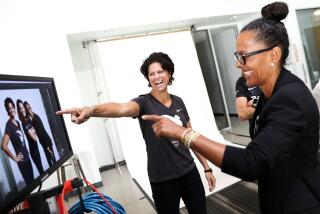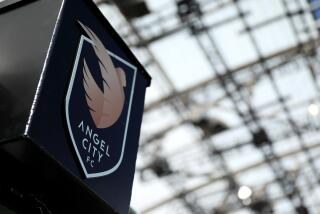New Chief of Pacific Southwest Hopes to Find Strength in Diversity
- Share via
Pacific Southwest Corp. is a quirky little concern with an eclectic variety of businesses.
It owns 384 acres of largely undeveloped land in northern San Diego County; it counts kiwi farms, beehives and industrial sewing machines among its assets; it services commercial and residential mortgage loans and leases cars and computers, and it picks, packs and stores crops from farms owned by others.
The Northridge-based company, founded in 1980 by President Jerry Fraschilla, has always been a bit short on a long-term game plan, which helps explain its detours into unusual businesses. “When I originally started, it was not with a preconceived idea,” Fraschilla said. “It just sort of evolved.”
And the company just sort of drifted into obscurity. Although Pacific Southwest has been consistently profitable--it earned $123,402 on $1.9 million in sales for the nine months that ended April 30--its stock has all but been ignored by institutional investors. The stock trades on the so-called “pink sheets” over-the-counter market, which lists small, thinly traded stocks that don’t attract much attention.
Work Same Magic
But William Hutchinson, president of Hutchinson Securities, a San Francisco investment banking firm, recently bought a 1% stake in Pacific Southwest and was elected to the firm’s board of directors. Hutchinson is betting that Pacific Southwest’s newest asset--its chairman, Ronald Langley, 45--will be able to work the same kind of magic for the tiny company that he did while working for New Zealand’s second-largest company, Brierley Investments.
“With Ron Langley there, we’ll have no difficulty in attracting additional capital for further expansion,” Hutchinson said. By using Langley’s contacts, Fraschilla said he is hoping to turn Pacific Southwest into a national financial services company.
Langley is also wagering on his ability to turn Pacific Southwest into a success story. One of his first steps was investing $1 million to buy 333,333 shares, or about 17% of Pacific Southwest’s stock, and he received options to buy another 333,333 shares at $5 each. (Fraschilla and his family own about 24% of the company.)
But building another success figures to be a lot tougher this time around for Langley. Brierley is a huge international concern with $7 billion in assets and access to virtually unlimited sources of capital, while Pacific Southwest’s net worth, based on the difference between its assets and debt, is a mere $4 million, with little extra cash for investments.
Langley says the company could easily raise $2 million for investments or acquisitions with its existing cash and assets. But if Pacific Southwest’s plans are big, that won’t go too far. And raising money by selling more stock doesn’t seem like an option given the company’s meager appeal among large investors.
What it all comes down to is that the pressure is on Langley to not only find crackerjack investments, but to also lure enough big partners to help share the risk of those investments.
Despite these obstacles, Langley is bold enough to say that his plan is to attract a larger company that will buy into Pacific Southwest with a $10-million to $20-million investment and provide the resources necessary for a more significant expansion. The lure for such an investor will be his history of spotting profitable investments, he said.
“We’re starting with a smaller size,” Langley said. “But if we come up with an attractive enough investment, we can always get financing. Our equity portion might be smaller, but if it’s good enough, there’s always a way of making the investment work.”
Langley is already checking out investment opportunities to exploit in financial services, particularly since the savings and loan crisis has left many insolvent thrifts ready to dump assets such as mortgage operations and real estate.
Move Fast
Peter Brook, an analyst at the New Zealand brokerage Hendry Hay McIntosh Ltd., said he expects Langley to move fast.
“The only difference is he won’t have the capital base to work with initially and the deals will be smaller,” Brook said. “You’ll see him buy perhaps some unusual companies that might not look like much, but he’ll be able to do something with them.”
This faith in Langley stems from his track record when he worked for Sir Ronald Brierley, who was chairman of Brierley Investments until a recent change of control. Brierley isn’t a big name to most Americans, but he’s a big-time investor who became an international figure by investing in companies in Australia, Europe and the United States.
Since moving here from his native Australia in 1984, Langley served as executive director of Industrial Equity Pacific Ltd., Brierley’s North American investment group. And Langley followed Brierley’s investment style, which involves looking for undervalued businesses, no matter how offbeat or eclectic they might be.
“Langley was very much a Brierley’s man,” said Michael Willis, an analyst at James Capel & Co., a London brokerage firm.
$1-Billion Portfolio
In those five years, Langley built Industrial Equity’s portfolio of U.S. investments from $2 million to about $1 billion. Langley bought Everest & Jennings, the Los Angeles wheelchair manufacturer; bought and sold Higbee Co., a Cleveland department store chain, and at one time owned a stake in Calmat Co., a Los Angeles cement maker, and Resorts International, the Atlantic City gambling and hotel chain.
Langley claims Higbee as his biggest coup. Higbee was foundering through a depressed local economy in 1984 when Langley started buying stock. “The broker I first gave the order to thought that I was a bit of a madman” because the firm was in such bad shape, he said.
But Langley saw a talented retail team and valuable underlying assets at Higbee, such as real estate that would eventually bounce back from the slump. Brierley acquired the company for $72 million and sold it three years later for $165 million.
After spending 14 years amassing investments for someone else, Langley wanted to do it for himself. “I was looking to have more equity in what I did next,” he said.
That next step became Pacific Southwest. Actually, Fraschilla initially approached Langley and tried to get Industrial Equity to make a $10-million investment in Pacific Southwest. The deal never materialized, but Fraschilla and Langley hit it off.
Boost in Net Worth
A few months later, Langley quit his post with Brierley to become chairman at Pacific Southwest. Langley’s $1-million investment helped boost the firm’s net worth to at least $4 million, the minimum required for the company’s stock to be listed on the higher profile National Assn. of Securities Dealers National Market list. Having its stock traded on NASDAQ might eventually help Pacific Southwest sell more stock to raise money for its expansion.
In the meantime, Langley and Fraschilla hope that the encroaching development from San Diego and Orange counties will soon catch up to the firm’s land holdings near Escondido and Ramona, giving them the opportunity to profit from land sales or to take part in developments. That might not happen soon, though, since zoning changes in northern San Diego County are often tough to come by.
“Just having the land alone won’t guarantee the next step,” said Hugh Sinnock, head of the San Diego office of W. Ross Campbell, a mortgage banking company. “But if it’s in the direction of growth, it’s just a matter of time.”
The company’s other operations remain small and exist largely to generate income so Pacific Southwest can afford to hang onto the land.
Retired in 1973
Fraschilla, 52, retired as Technicolor’s vice president of corporate development in 1973 and got into the real estate business. He opened Pacific Southwest in 1980 and two years later started a mortgage brokerage business to avoid paying fees on land he bought and sold.
This year, the mortgage business, which collects fees on loans originated by lending institutions, expects to handle about $180 million in residential mortgages and up to $60 million in commercial loans, including those processed through mortgage businesses in the Bay Area and Santa Ana that Pacific Southwest recently agreed to acquire. Those loans would produce between $1.5 million and $3 million in pretax income, Fraschilla said.
The company also leases such equipment as cars, computers, sewing machines and medical equipment, and it remains in various agricultural businesses.
Langley said he plans to stay in all those businesses and expand them as quickly as possible while searching out opportunities such as Higbee that would interest other investors and give Pacific Southwest the chance to buy assets on the cheap.
All of his grand plans, of course, turn on whether he can come up with the money to pay for these ventures. “But I’ve always found in the past that if an idea is good enough, you’ll always find someone with the money,” Langley said.
Stockholders in Pacific Southwest can only wish him good hunting.
More to Read
Inside the business of entertainment
The Wide Shot brings you news, analysis and insights on everything from streaming wars to production — and what it all means for the future.
You may occasionally receive promotional content from the Los Angeles Times.











